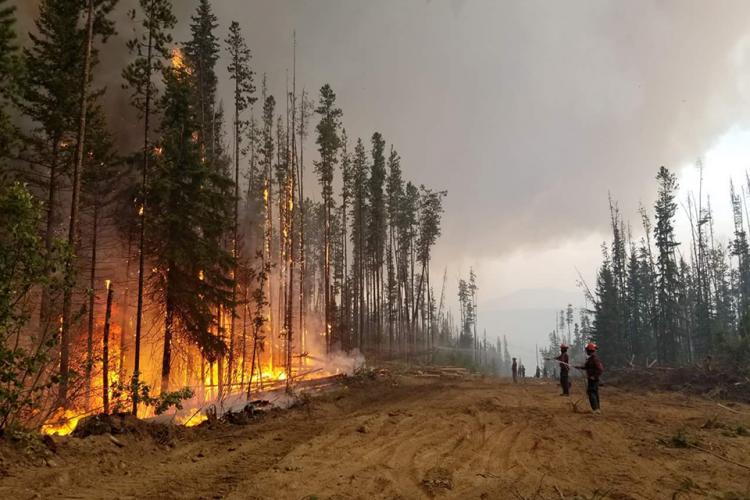Researchers from Canada and the United States want to de-escalate the devastating forest wildfires that are increasingly occurring due to climate change, while strengthening development of a forest-based bioeconomy in British Columbia (BC), boosting carbon uptake and reducing emissions.
These goals are part of a $1 million, four-year Theme Partnership project called "Wildfire and Carbon" announced today (1/27) by the Pacific Institute for Climate Solutions (PICS), which is hosted and led by the University of Victoria. The project team includes scientists from the Canadian Forest Service, the University of British Columbia (UBC), and the USDA Forest Service.
Judi Beck, director general of Natural Resources Canada's Pacific Forestry Centre, explains that managing forests to achieve emissions reductions involves many complex trade-offs. For example, wildfire risk reduction activities such as controlled burning to reduce fuel loading and create fire breaks release greenhouse gases and smoke which contribute to climate change and affect human health.
"Recent unprecedented wildfires in BC, Alberta, California and now Australia show that we need to take a long-term approach in managing our forested landscape and to address the impacts of climate change. For example, can short-term increases in emissions from fuel reduction treatments, bioenergy use and creation of fire breaks be justified given the expected emission reductions from less severe wildfires in the future?" adds Beck. "These are the questions we are looking to answer."
Werner Kurz, Natural Resources Canada senior research scientist and principal investigator (PI) of the Wildfire and Carbon project, says wildfires can quickly wipe out the carbon uptake and storage provided by living forests. "For example, direct emissions from British Columbia's 2017 and 2018 wildfires were each more than three times those of all BC's sectors combined," he says.
Kurz says the project will investigate opportunities to reduce future emissions through proactive landscape management, including fuel reduction that makes use of the biomass in a bioeconomy. Biomass derived from thinning, the creation of fire breaks or from wood left after harvest that is currently burned in slash piles could instead be used in long-lived wood products such as building materials, which store carbon and are a substitute for emissions-intensive steel or concrete, he says.
Lori Daniels, a co-PI and professor with UBC's Department of Forest and Conservation Sciences, says the project is aiming for transformative change.
"We envisage a future where the goals of fire risk reduction, bioeconomy, emissions reduction and increased resilience of the forests to climate change, can be quantified, evaluated, managed, and achieved," she says. "Being able to share our Canadian and US expertise, analytical tools and data is incredibly important for ensuring the resilience of our Pacific Northwest forests, including the coastal, mountain and boreal forest landscapes."
"This project affords us opportunities to merge simulation of wildfire and forest successional dynamics with carbon accounting. Wildfires create landscape memories' that influence future fire severity and extent. By getting the fire on fire interactions right, we hope to improve carbon accounting under current and future climates," says co-PI Paul Hessburg, a US Forest Service senior research scientist.
This new project will also build on past research by the PICS Forest Carbon Management Project, which enables forest carbon dynamics to be simulated down to the single hectare, for nearly all forested areas in BC.
PICS Executive Director, Sybil Seitzinger, says Wildfire and Carbon is one of the institute's flagship Theme Partnership projects, which tackle complex and critically important climate mitigation and adaptation challenges. She says this project also aims to have a positive spinoff for the forestry sector, with the potential development of new bioeconomy opportunities and jobs.
The four-year project begins this month. For more details visit the PICS website.
The Pacific Institute for Climate Solutions develops impactful, evidence-based climate change solutions through collaborative partnerships which connect solution seekers with experts from BC's four leading research universities. The PICS Theme Partnership Program supports research on particularly complex and critically important climate mitigation and adaptation challenges, and develops legacy partnerships for BC and beyond. PICS is hosted and led by the University of Victoria in collaboration with the University of British Columbia, Simon Fraser University and the University of Northern British Columbia.
Canadian Forest Service (Natural Resources Canada)
The Canadian Forest Service is the national and international voice for Canada's forest sector. We are part of Natural Resources Canada, a federal government department, and have an office in Ottawa and six research centres across the country. We collaborate closely with Canada's provinces and territories to ensure our forests are sustainable and healthy for our country and the world to enjoy.
University of British Columbia (UBC Faculty of Forestry)
The UBC Faculty of Forestry is recognized globally as one of the leading forestry faculties in the world. What began in 1921 with the first lecturer being appointed to the new Department of Forestry today embodies a comprehensive offering of undergraduate and graduate programs that cover a breadth of disciplines including wood products science, natural resources conservation, forest sciences, urban forestry and forest resources management. Our programs model the broad spectrum of topics that relate to forests' interplay between our environment and all those who live on our planet.
USDA Forest Service, Pacific Northwest Research Station
The USDA Forest Service's Pacific Northwest Research Station is a leader in the scientific study of natural resources. It generates and communicates impartial knowledge to help people understand and make informed choices about natural resource management and sustainability. The station is an integral component of USDA Forest Service Research & Development, which is the most extensive natural resources research organization in the world. Home to approximately 300 employees and headquartered in Portland, Ore., the station has 11 laboratories and research centers in Alaska, Oregon, and Washington as well as 12 active experimental forests, ranges, and watersheds.

Source: BC Wildfire Service, Province of British Columbia. Copyright (c) Province of British Columbia. All rights reserved. Reproduced with permission of the Province of British Columbia.










